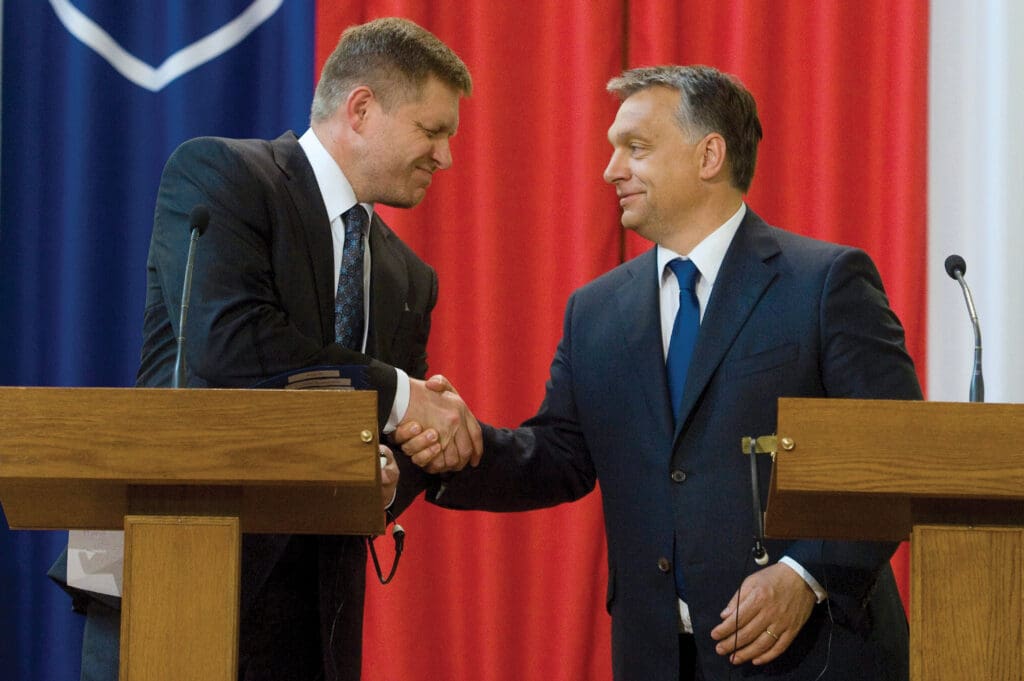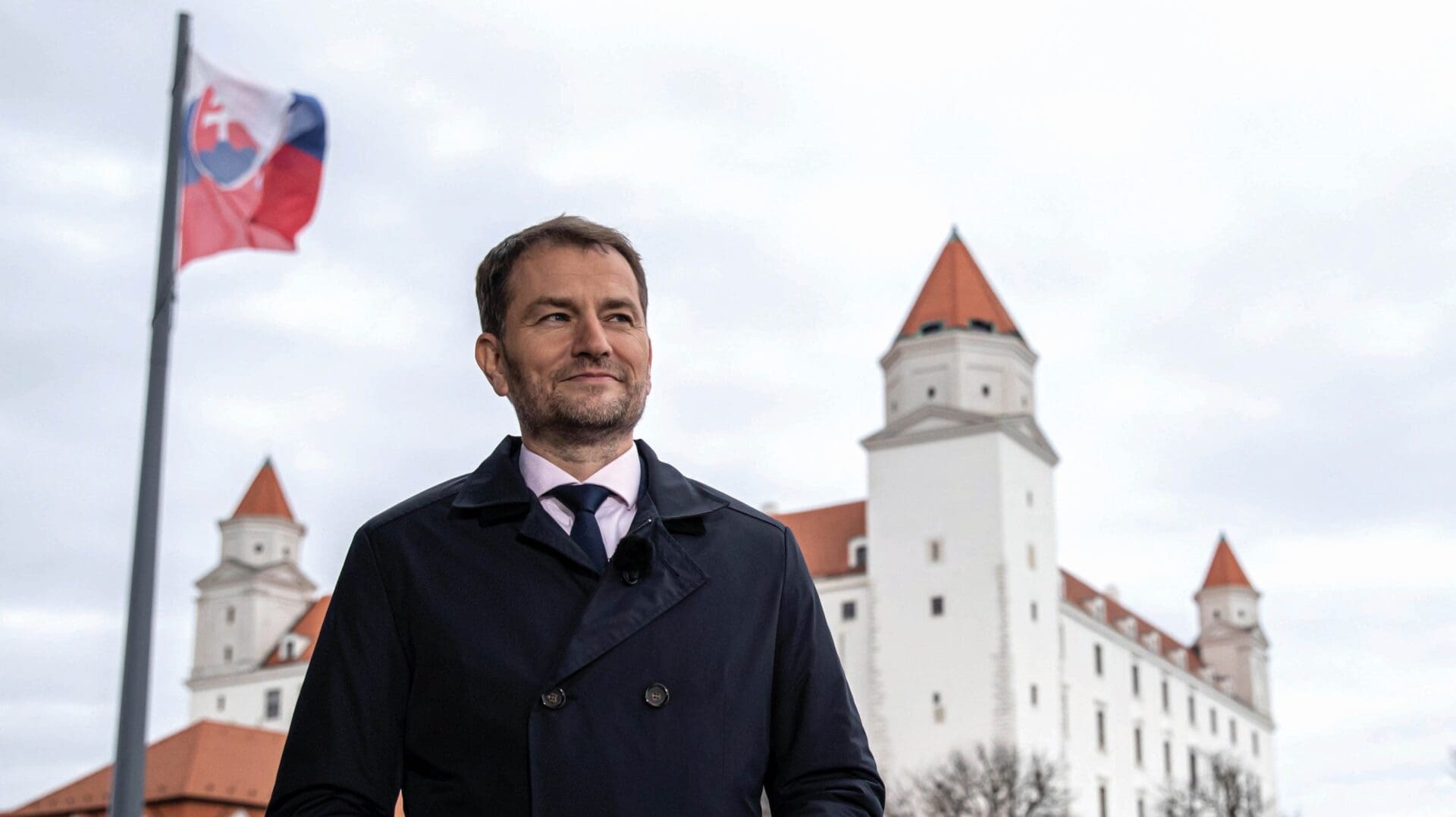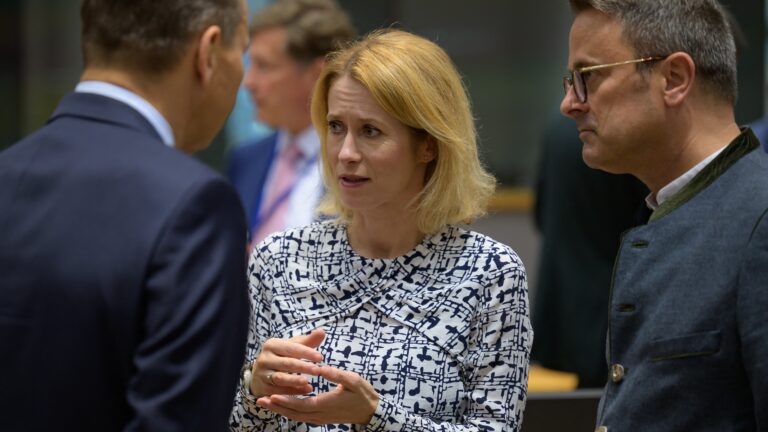This article was published in Vol. 3 No. 4 of our print edition.
The 2023 elections in Slovakia were looked upon with great anticipation by both the conservative and liberal sides. The stakes were high: whether the Central European country would remain on a progressive road or take a national turn. With a 68.51 per cent1 voter turnout, the result left a mathematical path to government for either side of the political spectrum. In the end, pragmatism triumphed, and a patriotic-national coalition was created that spans the political spectrum. Robert Fico will be able to form a government for the fourth time, and it is far from impossible that his ally, the future Speaker of the House Peter Pellegrini, will run for the presidency next year. The Slovak National Party, which was once famous for its anti-Hungarian stance but is now a declared follower and supporter of Hungary’s domestic and foreign policy, also became a government coalition member. The most chaotic period in the country’s history ended with the inauguration of its new government.
Slovakia last held parliamentary elections three years earlier, on 29 February 2020, which yielded a surprising result. With 65.80 per cent2 voter participation, the political troll Igor Matovič and his party, OĽaNO (Ordinary People and Independent Personalities), who until then mostly excelled in guerrilla marketing, obtained 25.02 per cent3 of the votes and became the largest party with a sensational campaign finish. Although Matovič had previously stated that he considered himself unfit4 for the role of prime minister, his voters thought otherwise. During negotiations, a decision was made to establish a four-party coalition government, which besides OĽaNO, included the party of the new speaker, Boris Kollár’s Sme rodina (We are a Family) with 8.24 per cent, the liberal SaS (Freedom and Solidarity) with 6.22 per cent, as well as the party established by Andrej Kiska, the former president of the Slovak Republic, Za ľudí (For the People) with 5.77 per cent. This formation seemed extremely solid as it obtained a constitutional majority. However, Matovič took over the leadership of Slovakia from Peter Pellegrini—who at that time was still a politician of Fico’s SMER-SD—in an extremely difficult situation, since the COVID-19 pandemic was beginning and immediate decisions had to be made to protect the population. The first stage of the defence was managed by the outgoing prime minister, who had already lost the elections. During this short period, he established his later popularity with daily press appearances and clear, decisive actions. The extent to which the costs of the response did not matter to those leaving we know from an audio recording5 made at a press conference where Prime Minister Peter Pellegrini and Minister of the Interior Denisa Saková talked about the fact that although expensive measures had been taken, finding the source of their financing would be the responsibility of the new government.6
However, when Matovič’s government took office, their lack of preparation became immediately evident, resulting in chaotic outcomes. The new political leadership mistakenly ordered the closure of district borders to contain the pandemic, causing nationwide chaos in traffic flow.7 Instead of admitting they had made a mistake, Matovič fuelled public outrage, arguing that he had not announced the implemented measure during his press conference and that sabotage had occurred. To this, national police chief captain Milan Lučanský, who had been appointed by Pellegrini and was still in office at the time, responded by saying that the police do not act based on press conferences but following government decisions and the instructions of the Ministry of the Interior. Lučanský resigned8 from his position in the summer of 2020. He questioned the excessive politicization of the police and the decisions made by the Ministry of the Interior. However, in December of that year, he was already in the crosshairs of the authorities and was detained on charges of corruption, extortion, and misuse of classified data.9 The former police chief did not survive his trial, as he committed suicide in his cell on 31 December 2020.10
Matovič was elected prime minister on the basis of his promise to deal with the ‘mafia state’ and corruption. However, many scandals broke out during his prime ministership, of which he was usually the focus. Several leading politicians, including the prime minister himself, were found to have produced their university thesis papers in an ethically questionable manner rather than by their own intellectual effort. Matovič submitted his thesis in 1998, and as it turned out, it resulted from combining two source works. Despite his evident plagiarism,11 he did not resign. A scandal also broke out in connection with the thesis of Speaker of the House Boris Kollár.12 He tried to defend himself against the accusations of plagiarism in a press conference,13 but with little success. Just like the prime minister, he also kept his position. The extent to which education was not a priority in Slovakia is clearly shown by the fact that, although the pandemic situation had eased somewhat by the late spring of 2020, the government nevertheless decided not to hold secondary school leaving examinations. Students obtained their final results from the average of the grades of the four previous academic years. Only those who wanted to improve grades or take an exam in an additional optional subject had to appear before the examination board.14 The decision acted as an alibi, went against professional integrity, and degraded the importance of the already low-prestige exam system.
Matovič’s decree mandating weekly COVID-19 antigen testing of the entire population, enacted in November 2020, also proved to be a controversial measure.15 The prime minister called the procedure a nuclear weapon16 against the virus. However, it turned out to be extremely expensive and increasingly pointless due to the gradually growing number of absentees. What is more, the acceptance of the process was not helped by the unreliability of the antigen tests. There was an example in which a patient was sent home with a positive result at one testing station and then produced a negative result at another location.17 This form of behaviour usually resulted in police proceedings. Although the population was initially extremely disciplined about testing, this gradually changed, and they started to see it as a mandatory waste of time.
Despite the crucial public position he held, Matovič was never considered a serious politician. Nevertheless, he has always had a vision and a sense of public diplomacy. As the newly appointed prime minister, one of his goals was to improve Slovak–Hungarian bilateral relations and treat the ethnic Hungarian community living in Slovakia positively. As is widely known, Hungary’s greatest ever national tragedy was the Trianon Peace Treaty signed on 4 June 1920, which deprived the country of two-thirds of its territory and a significant portion of its inhabitants. Without this document, however, it would be unthinkable to talk about independent Slovak statehood, as a result of which this accord is still considered a neuralgic point in the relationship between the two nations. However, Matovič rose above history and organized a commemoration in Bratislava Castle, inviting—in a symbolic manner—one hundred ethnic Hungarian public figures from Slovakia. In his speech, he emphasized the importance of shared visions and voiced his support for seeking answers to the shared problems affecting Hungarians, Slovaks, and other nationalities living in the Slovak Republic:
‘I think that historical Hungary was also ours. Together with the Hungarians and the other nationalities, the Slovaks fought against the Turkish conquest.
The Hungarian kings decided not only on the life and fate of the Hungarians but also on the Slovaks and everyone who lived on the territory of historical Hungary.’18 All these thoughts had previously been unimaginable in Slovak public law discourse.
During his administration, Matovič tried to maintain good relations not only with the ethnic Hungarians living in Slovakia but also with the government of Hungary. Albeit indirectly, this was to lead to his loss of power. In the early spring of 2021, the COVID-19 pandemic was raging with renewed vigour, and claimed a large number of victims. At that time, the vaccine tested by Western laboratories was not yet available in sufficient quantities in Slovakia. Matovič asked for Prime Minister Viktor Orbán’s help. Hungary—uniquely in the European Union—has already used the Sputnik V vaccine,19 which the European Medicines Agency had not approved. Matovič, with Hungarian mediation, secretly travelled to Moscow, where he ordered around two million shots of the Russian vaccine.20 His well-intentioned move caused a domestic political storm. On behalf of the party SaS, Foreign Minister Ivan Korčok shared his objections to the prime minister’s move in an open Facebook post, while Veronika Remišová, representing the party Za ľudí, called Matovič’s procedure absurd, as was, in her view, the use of a drug in Slovakia that had not been tested by the European Medicines Agency.21 The internal tension was so high that several ministers resigned, and it was feared that the government coalition would fail. To avoid this, Matovič stepped down22 as prime minister but continued as Minister of Finance. As PM, he was succeeded by the former Minister of Finance Eduard Heger.23 The usage of the Russian vaccine in Slovakia began only in June 2021.24
‘Looking at the new government’s composition, there is a clear answer to the question whether Slovakia wants to move forward on a national path’
Prime Minister Heger took office on 1 April 2021. His deputies become Richard Sulík, Minister of Economy (SaS); Igor Matovič, Minister of Finance (OĽaNO); Veronika Remišová, Minister of Investments, Regional Development and Informatization (Za ľudí) and Štefan Holý, Minister of Legislation and Strategic Planning (Sme rodina). Although, for a while it seemed that this arrangement would be viable and could last until the end of the electoral term, it did not. In the summer of 2022, the government was again in crisis. As before, the fault lines arose between Sulík and Matovič, and the subject was a tax bonus for children’s leisure activities,25 which was part of the anti-inflation package presented by the former PM. The bill was accepted by the Parliament even at the first reading, without the vote of the SaS representatives; the coalition was helped out by the opposition during the ballot.26 However, President Zuzana Čaputová vetoed the decision.27 It was questionable whether the veto could be broken. The coalition was already divided into two camps; OĽaNO and Sme rodina continued to support it, while Za ľudí and SaS opposed the law. However, the package was finally accepted with opposition votes.28
The SaS demanded Matovič’s head. As he refused to step down as Minister of Finance, all SaS ministers resigned in response, and the party went into opposition on 31 August 2022.29 Heger continued as prime minister, leading a minority government, but on 15 December 2022 it lost the vote of confidence, which sealed his fate.30 President Čaputová dismissed Heger’s government the day after the vote. However, until the appointment of a new government, she temporarily entrusted it again with the country’s leadership, albeit with limited powers. So Heger went but stayed. Čaputová declared that early elections should be held in the first half of 2023. She asked legislators to create all necessary resolutions by the end of January.31 Among the preconditions for calling early elections was the amendment of the constitution, as it had not previously proved possible to shorten the duration of the election cycle. The constitution was amended on 25 January 2023.32 It was also decided that the early elections would only occur on 30 September 2023.33 The opposition called the decision undemocratic.
Heger’s was a caretaker government; however, it did not act as such in some cases. Although a provisionally mandated Slovak government with a limited mandate should theoretically not have been able to conclude an international treaty, Heger’s cabinet nevertheless decided to give Ukraine 13 MiG-29 fighter jets and a part of Slovakia’s KUB air defence system. President Čaputová proved to be a partner in this endeavour.34 According to the agreement, Slovakia should receive about 200 million euros in compensation from the European Peace Facility, and the United States should deliver military equipment worth about 700 million dollars to Slovakia.35 It has since been revealed that the USA’s offer is not a subsidy but a discount on purchasing additional military equipment.36

Although the original presidential intention was that the caretaker government of Heger would govern the country until early elections, it had become clear by the spring of 2023 that the prime minister could not keep his cabinet together. As a result of internal tensions, four ministers resigned in a few weeks. The most unpleasant case involved the Minister of Agriculture,37 whose family company received a non-refundable grant of 1.4 million euros from the Ministry of Environmental Protection. Although Prime Minister Heger tried to find a way to continue, the president decided to appoint a government of experts to lead the country until the September election. Acting Prime Minister Heger had failed, and the extent of his downfall was revealed only during the autumn elections. The degree to which the Slovak population had rejected him is demonstrated by the performance of his newly founded party, Democrati (Democrats), which managed to obtain only 2.93 per cent38 of the vote. With this result, they neither entered the Parliament nor received state support. Although under the leadership of Matovič and Heger, Slovakia underwent a chaotic era, it must be seen that they constantly had to face enormous problems—the pandemic, the war in Ukraine, the energy crisis, migration, and internal tensions. The coalition promised reforms and changes, but in many cases the personality traits and egos of the elected politicians stood in the way of implementing the needed reforms. The constant internal tensions and the desire for relative strength among the allies precluded the possibility of achieving great goals. Their downfall was thus inevitable.
With Heger’s ministers resigning, President Čaputová also recognized the need for a radical change in the country’s leadership. She took a brave step and, putting her own presidential authority at risk, appointed a new government of experts before the autumn election. It was clear from the first minute that the mandate of her new cabinet would only last until the formation of an elected government after the early elections in September. It was also agreed that none of the new cabinet members would run for office during the 2023 elections. President Čaputová’s decision is also historic from the point of view of minority politics, as she appointed as prime minister the former vice president of the Slovak National Bank, Ľudovít Ódor, who thus became the first prime minister in Slovakia’s history with an ethnic Hungarian background and mother tongue.39 Among other things, the appointed government considered its main task to be the establishment of an atmosphere of calm, stability, and tolerance, an increase in the country’s competitiveness, and the more effective use of EU funds.40
From the outset, the Ódor government was attacked from all political sides. This was also reflected in the vote on the government’s programme statement; in the 150-person Parliament, only two parties, SaS and the Democrats, backed the bill, amounting to a total of 34 representatives.41 Thus, Ódor found himself in the same situation as Heger in December 2022. Due to the lack of trust, he could only govern with limited powers. His cabinet could not make hard decisions or adopt international conventions.42 Despite limited support, the new government performed its task effectively and, in addition, compiled a package of measures consisting of nearly a hundred points, which would make it possible to reduce the state’s indebtedness and put public finances in order. At the same time, this list includes several items—tax increases (VAT, real estate), and a pension reduction—which would hardly be popular among the population. It is up to the new Fico government to decide on whether to implement these measures or keep their campaign promises, according to which banks and multinational companies should be subjected to more robust taxation.
Early parliamentary elections were held on 30 September 2023. In accordance with the results expected by pollsters, Robert Fico’s party, SMER-SD (Direction – Social Democracy), won with 22.94 per cent. SMER’s primary ideological opponent, PS (Progresívne Slovensko – Progressive Slovakia), obtained 17.96 per cent of the votes and qualified as the second-strongest party in the Parliament. Both parties of the two former prime ministers, Pellegrini’s Hlas-SD (Voice – Social Democracy – 14.70 per cent) and Matovič’s OĽaNO a priatelia in coalition with Za ľudí and KÚ (8.89 per cent) crossed the entry threshold. The Christian democratic KDH (6.82 per cent), the liberal SaS (6.32 per cent), and the national SNS (5.62 per cent) also won enough votes to sit in the National Council of the Slovak Republic.43 Contrary to the expectations of many, the party representing ethnic Hungarians living in Slovakia, Aliancia – Szövetség (Alliance), did not enter the Parliament.
The biggest question of the elections was whether Slovakia would remain on a liberal path or witness a return to the country’s previously characteristic nationalist-patriotic orientation. Although both variations would have been feasible mathematically, in the end, political rationality prevailed, and SMER, HLAS, and SNS formed a coalition government. Their parliamentary majority is not solid, but it is manageable; the coalition holds 79 seats in the 150-person legislature. Fico became the prime minister, and his ally, Pellegrini, became Speaker of the National Council of the Slovak Republic. Although no direct statements were made in this regard, it would seem that Pellegrini may participate in the 2024 presidential election as a potential candidate. Although it was clearly not the government preferred by the president, she eventually appointed it.44 This did not go smoothly either, as Čaputová objected45 to the SNS’s candidate for the head of the Ministry of Environmental Protection and thus it was feared that the entire government would not take office until this dispute was resolved. However, Fico declared that he wished to represent Slovakia at the EU summit at the end of October.46 Ultimately, the new government relented on the issue, and the candidate nominated by SNS was changed. On 25 October 2023, Fico became prime minister of Slovakia for the fourth time. At the EU summit held the following day, he announced that Slovakia would no longer supply weapons to Ukraine and demanded an immediate ceasefire. As he put it, the European Union must change from an arms supplier to a peacemaker.47 Until then, only Hungarian Prime Minister Viktor Orbán had articulated such ideas in Brussels.
Looking at the new government’s composition, there is a clear answer to the question whether Slovakia wants to move forward on a national path. However, the extent of Fico’s room for manoeuvre in achieving his goals is questionable. It is clear that with the initiation of the rule of law procedure and the suspension of EU subsidy payments, Hungary is also paying a heavy price for its separate-path policy.
NOTES
1 ‘Súhrnné výsledky hlasovania‘, Štatistický úrad Slovenskej republiky (1 October 2023), https://volby.statistics.sk/nrsr/nrsr2023/sk/suhrnne_vysledky.html, accessed 20 October 2023.
2 ‘Definitívne výsledky hlasovania‘, Štatistický úrad Slovenskej republiky (1 March 2020), https://volby.statistics.sk/nrsr/nrsr2020/sk/data01.html, accessed 20 October 2023.
3 ‘Platné hlasy odovzdané pre politické subjekty‘, Štatistický úrad Slovenskej republiky (1 March 2020), https://volby.statistics.sk/nrsr/nrsr2020/sk/data02.html, accessed 20 October 2023.
4 ‘Urážanie sa je prejavom slabosti a môže viesť k ďalšej eskalácii, podráždeniu, útokom a rozleptávaniu spolupráce, hovorí odborník‘, Plus 7 Dní (9 April 2020), https://plus7dni.pluska.sk/domov/zruti-matovicova-sebalutost-sokovala-aj-jeho-volicov-toto-mu-odkazuje-psycholog, accessed 20 October 2023.
5 ‘Pred začiatkom brífingu, keď nevieš, že sú zapnuté mikrofóny. Ale veď to je jedno. Oni na to už hľadať peniaze nebudú’, Denník N (11 March 2020), www.facebook.com/watch/?v=622722418564255, accessed 21 October 2023.
6 ‘Pellegrini o koronavíruse: Bude to drahé. Saková: No a čo. Veď oni na to budú hľadať peniaze’, Denník N (11 March 2020), https://dennikn.sk/minuta/1795303/, accessed 21 October 2023.
7 ‘Matovič viní Lučanského: Kontroly mali byť námatkové! Policajný prezident sa bráni, riadili sme sa pokynmi’, Topky (8 April 2020), www.topky.sk/cl/10/1883383/Matovic-vini-Lucanskeho–Kontroly-mali-byt-namatkove–Policajny-prezident-sa-brani–riadili-sme-sa-pokynmi, accessed 21 October 2023.
8 ‘Lučanský ODSTUPUJE z funkcie! S vedením Ministerstva vnútra už viac NECHCEM spolupracovať’, Plus jeden deň (30 June 2020), https://www1.pluska.sk/krimi/lucansky-odstupil-funkcie-vedenim-ministerstva-vnutra-viac-nechcem-spolupracovat, accessed 22 October 2023.
9 ‘Bývalý šéf polície Milan Lučanský ide do väzby’, Startitup (6 December 2020), www.startitup.sk/aktualne-byvaly-sef-policie-milan-lucansky-ide-do-vazby/, accessed 22 October 2023.
10 ‘Generál Milan Lučanský zomrel. V cele si siahol na život’, Pravda (30 December 2020), https://spravy.pravda.sk/domace/clanok/573262-v-pripade-lucanskeho-sa-zacalo-trestne-stihanie-informacie-o-mozgovej-smrti-sa-podla-zilinku-nepotvrdili/, accessed 22 October 2023.
11 ‘Prečo je Matovičova diplomovka plagiát a prečo prorektor UK hovorí, že nemala prejsť’, Denník N (26 July 2020), https://dennikn.sk/1980254/preco-je-matovicova-diplomovka-plagiat-a-preco-prorektor-uk-hovori-ze-nemala-prejst-video-a-vizualizacia/, accessed 23 October 2023.
12 ‘Nielen diplomovka, aj Kollárova bakalárska práca je pochybná’, SME (25 June 2020), https://domov.sme.sk/c/22433939/boris-kollar-diplomovka-sme-rodina.html, accessed 24 October 2023.
13 ‘Boris Kollár je plagiátor ako Andrej Danko. Na Kmotríkovej škole podvádzal’, Denník N (23 June 2020), https://dennikn.sk/1942222/boris-kollar-je-plagiator-ako-andrej-danko-na-kmotrikovej-skole-podvadzal/, accessed 24 October 2023.
14 ‘Maturitné skúšky 2019/2020’, Korona.gov.sk, https://korona.gov.sk/maturitne-skusky-2019-2020/, accessed 24 October 2023.
15 ‘Celoplošné a plošné testovanie na COVID-19’, Korona.gov.sk, https://korona.gov.sk/celoplosne-plosne-testovanie-na-covid-19/, accessed 24 October 2023.
16 ‘Matovič: Máme v rukách atómovú zbraň na vírus’, Žilinský Štandard (4 November 2020), https://zilina.standard.sk/1452/matovic-mame-v-rukach-atomovu-zbran-na-virus, accessed 25 October 2023.
17 ‘Muž sa otestoval dvakrát: Jeden test mal pozitívny, druhý negatívny’, Teraz (8 November 2020), www.teraz.sk/slovensko/policia-muz-sa-dal-dvakrat-otestova/506329-clanok.html, accessed 24 October 2023.
18 ‘Igor Matovič trianoni beszéde’, Körkép (3 June 2020), https://korkep.sk/cikkek/szemle/igor-matovic-trianoni-beszede-eloszor-magyar-forditasban-a-korkepen/, accessed 25 October 2023.
19 ‘Russia’s Sputnik V Vaccine Gets All-Clear in Hungary’, France 24 (8 February 2021), www.france24.com/en/video/20210208-russia-s-sputnik-v-vaccine-gets-all-clear-in-hungary, accessed 25 October 2023.
20 ‘Premiér: Slovensko nakúpi dva milióny kusov ruskej vakcíny Sputnik V’, Úrad vlády Slovenskej republiky (1 March 2021), www.vlada.gov.sk/premier-slovensko-nakupi-dva-miliony-kusov-ruskej-vakciny-sputnik-v/, accessed 25 October 2023.
21 ‘Sputnik dorazil na Slovensko. Korčok kritizuje Matoviča, SaS je zarazená’, Pravda (1 March 2021), https://spravy.pravda.sk/domace/clanok/579627-slovaci-poletia-do-ruska-pre-vakcinu-sputnik-v/, accessed 26 October 2023.
22 ‘Matovič vraj odstúpil. Obyčajní klamali, alebo nerozumeli ústave?’, Pravda (28 March 2021), https://spravy.pravda.sk/domace/clanok/582678-matovic-vraj-odstupil-obycajni-klamu-alebo-nerozumeju-ustave/, accessed 26 October 2023.
23 ‘Prezidentka vymenovala zrekonštruovanú vládu. Heger sa stal premiérom’, RTVS (1 April 2021), https://spravy.rtvs.sk/2021/04/prezidentka-vymenovala-zrekonstruovanu-vladu-heger-sa-stal-premierom/, accessed 27 October 2023.
24 ‘Očkovanie Sputnikom sa začalo, záujem je slabý’, Pravda (7 June 2021), https://spravy.pravda.sk/domace/clanok/590486-zacina-sa-ockovat-sputnikom-chce-ho-niekolko-tisic-ludi/, accessed 28 October 2023.
25 ‘Pre koho je nový daňový bonus na deti výhodný a kto naň doplatí’, Denník N (1 August 2022), https://e.dennikn.sk/2954087/pre-koho-je-novy-danovy-bonus-na-deti-vyhodny-a-kto-nan-doplati-tabulky-vypoctov-od-januara/?ref=mwat, accessed 29 October 2023.
26 ‘A parlament elfogadta Matovič inflációs csomagját, az OĽaNO büszke rá, hogy támogatták őket Kotlebáék.’, Paraméter (25 May 2022), https://parameter.sk/parlament-elfogadta-matovic-inflacios-csomagjat-az-olano-buszke-ra-hogy-tamogattak-oket-kotlebaek, accessed 30 October 2023.
27 ‘Prezidentka odmietla Matovičov balík a vrátila ho parlamentu’, Aktuality (7 June 2022), www.aktuality.sk/clanok/LHi5UHk/prezidentka-odmietla-matovicov-balik-a-vratila-ho-parlamentu/, accessed 30 October 2023.
28 ‘Poslanci PRELOMILI veto prezidentky: Matovičov protiinflačný balík BUDE!’, DNES24 (22 June 2022), https://www.dnes24.sk/parlament-prelomil-veto-prezidentky-matovicov-protiinflacny-balik-bude-418124, accessed 30 October 2023.
29 ‘Koaličná kríza: SaS dnes odchádza z vlády. Štvorkoalíciu môže ešte zachrániť Matovič’, Aktuality (31 August 2022), www.aktuality.sk/clanok/vwVY2AI/koalicna-kriza-sas-dnes-odchadza-z-vlady-stvorkoaliciu-moze-este-zachranit-matovic/, accessed 30 October 2023.
30 ‘Vláda Eduarda Hegera (2021–2023)’, SME, https://domov.sme.sk/t/8653/vlada-eduarda-hegera, accessed 30 October 2023.
31 ‘Čaputová odvolala vládu. Heger neplánuje obetovať Matoviča’, Pravda (16 December 2022], https://spravy.pravda.sk/domace/clanok/650755-caputova-odvolala-hegerovu-vladu/, accessed 30 October 2023.
32 ‘Poslanci schválili zmenu ústavy v súvislosti s predčasnými voľbami’, Národná rada Slovenskej republiky (25 January 2023), www.nrsr.sk/web/Default.aspx?sid=udalosti/udalost&MasterID=56287, accessed 30 October 2023.
33 ‘Voľby budú v septembri. Čaputová: Na poslednú chvíľu. Chaos sa skončil, mieni Kollár’, Pravda (31 January 2023), https://spravy.pravda.sk/parlamentne-volby-2023/clanok/655460-online-maj-jun-ci-september-poslanci-rozhodnu-o-termine-predcasnych-volieb-iste-vsak-nie-je-nic/, accessed 30 October 2023.
34 ‘VIDEO: Takto zo Slovenska posledný raz odlietali stíhačky Mig-29. Ukrajinci si po stroje prišli až na Sliač’, Refresher (24 March 2023), https://refresher.sk/133466-VIDEO-Takto-zo-Slovenska-posledny-raz-odlietali-stihacky-Mig-29-Ukrajinci-si-po-stroje-prisli-az-na-Sliac, accessed 2 November 2023.
35 ‘Vláda odobrila darovanie migov Ukrajine, Heger vycestuje do Kyjeva’, Pravda (17 March 2023), https://spravy.pravda.sk/domace/clanok/660639-vlada-odobrila-darovanie-mig-29/, accessed 2 November 2023.
36 ‘Oplatí sa Slovensku vymeniť migy za americké bojové vrtuľníky?’, Denník N (22 March 2023), https://dennikn.sk/3294655/oplati-sa-slovensku-vymenit-migy-za-americke-bojove-vrtulniky-otazky-a-odpovede/, accessed 2 November 2023.
37 ‘Firma rodiny agroministra Vlčana dostala od štátu astronomický obnos peňazí, Smer poriadne ZÚRI’, Plus jeden deň (03 May 2023), www1.pluska.sk/spravy/z-domova/firma-rodiny-agroministra-vlcana-dostala-statu-astronomicky-obnos-penazi-smer-poriadne-zuri, accessed 2 November 2023.
38 ‘Hlasy pre politické subjekty. Platné hlasy odovzdané pre politické subjekty podľa územného členenia’, Štatistický úrad Slovenskej republiky, https://volby.statistics.sk/nrsr/nrsr2023/sk/vysledky_hlasovania_strany.html, accessed 3 November 2023.
39 ‘Népszava: Ódor sa zapíše do dejín, nikdy nebol na Slovensku premiér maďarskej národnosti’, Pravda (12 May 2023), https://spravy.pravda.sk/svet/clanok/667121-nepszava-odor-sa-zapise-do-dejin-nikdy-nebol-na-slovensku-premier-madarskej-narodnosti/, accessed 3 November 2023.
40 ‘Tlačová konferencia novovymenovanej vlády SR’, Pravda (15 May 2023), https://fb.watch/o3fonqPg6I/, accessed 3 November 2023.
41 ‘Ódor nezískal podporu parlamentu. Pri hlasovaní znova nastal chaos, Kollár volal IT’, Pravda (15 June 2023), https://spravy.pravda.sk/domace/clanok/671360-hlasovanie-pvv-parlament-odor-vlada-program/, accessed 3 November 2023.
42 ‘Ódorova vláda dôveru nezískala, bude mať obmedzené kompetencie’, SME (15 June 2023), https://domov.sme.sk/c/23181552/vlada-uradnicka-odor-dovera-programove-vyhlasenie.html, accessed 4 November 2023.
43 ‘Hlasy pre politické subjekty. Platné hlasy odovzdané pre politické subjekty podľa územného členenia’, Štatistický úrad Slovenskej republiky, https://volby.statistics.sk/nrsr/nrsr2023/sk/vysledky_hlasovania_strany.html, accessed 4 November 2023.
44 ‘Prezidentka vymenovala novú vládu Roberta Fica’, Prezidentka Slovenskej republiky (25 October 2023), www.prezident.sk/article/prezidetka-vymenovala-vladu-roberta-fica/, accessed 4 November 2023.
45 ’Čaputová odmietla Huliaka. V rukách má tromf, no Fico už má riešenie a mohol by ju obísť. Aké sú možnosti?‘, Pravda (19 October 2023), https://spravy.pravda.sk/domace/clanok/685582-caputova-odmietla-huliaka-v-rukach-ma-tromf-no-fico-uz-ma-riesenie-a-mohol-by-ju-obist-ake-su-moznosti/, accessed 4 November 2023.
46 ‘Slovakia’s New Prime Minister Robert Fico to Attend EU Summit’, The Guardian (25 October 2023), www.theguardian.com/world/2023/oct/25/slovakia-prime-minister-robert-fico-attend-european-union- summit, accessed 5 November 2023.
47 ‘Slovakia’s Fico announces halt of military aid to Ukraine’, Politico (26 October 2023), www.politico.eu/article/slovakia-robert-fico-announce-halt-military-aid-ukraine/, accessed 5 November 2023.
Related articles:








